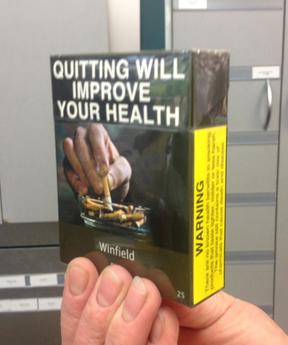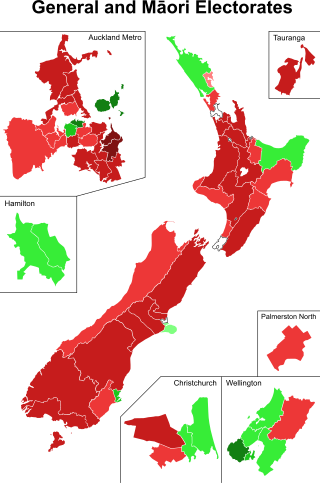
The Smoke-free Environments Amendment Act 2003 is an Act of Parliament in New Zealand that prohibits smoking in all workplaces including offices, clubs, pubs, restaurants, airports, and schools.

Smoking bans, or smoke-free laws, are public policies, including criminal laws and occupational safety and health regulations, that prohibit tobacco smoking in certain spaces. The spaces most commonly affected by smoking bans are indoor workplaces and buildings open to the public such as restaurants, bars, office buildings, schools, retail stores, hospitals, libraries, transport facilities, and government buildings, in addition to public transport vehicles such as aircraft, buses, watercraft, and trains. However, laws may also prohibit smoking in outdoor areas such as parks, beaches, pedestrian plazas, college and hospital campuses, and within a certain distance from the entrance to a building, and in some cases, private vehicles and multi-unit residences.
Action on Smoking and Health (ASH) is the name of a number of autonomous pressure groups (charities) in the anglosphere that seek to publicize the risks associated with tobacco smoking and campaign for greater restrictions on use and on cigarette and tobacco sales.

Because of the damage to health due to smoking in the United Kingdom it may be the first country to ban sales of cigarettes to people born after a certain year.

The New Jersey Smoke-Free Air Act is a comprehensive smoking ban that took effect in New Jersey on April 15, 2006. The law prohibits smoking in most workplaces as well as in indoor public areas. The Act has been amended a number of times including in 2009 to extend the ban to electronic smoking devices and in 2018 to extend the ban to public parks and beaches. A notable exception to the smoking ban is in casinos, but legislation to remove this exception is currently pending in the New Jersey Legislature. The New Jersey Smoke-Free Air Act also allows municipalities to enact their own restrictions on smoking.

The use of tobacco for smoking in New Zealand has been subjected to government regulation for a number of decades. On 10 December 2004, New Zealand became the third country in the world to make all indoor workplaces including bars and restaurants smoke-free. The smoking rate in New Zealand was about 8% as of 2023 when the new government planned to eliminate the nation's smoking ban to fund tax cuts.

The use of cannabis in New Zealand is regulated by the Misuse of Drugs Act 1975, which makes unauthorised possession of any amount of cannabis a crime. Cannabis is the fourth-most widely used recreational drug in New Zealand, after caffeine, alcohol and tobacco, and the most widely used illicit drug. In 2001 a household survey revealed that 13.4% of New Zealanders aged 15–64 used cannabis. This ranked as the ninth-highest cannabis consumption level in the world.
The Health Sponsorship Council (HSC) was a New Zealand Crown entity that used health promotion to promote health and encourage healthy lifestyles.

SmokinginCanada is banned in indoor public spaces, public transit facilities and workplaces, by all territories and provinces, and by the federal government. As of 2010, legislation banning smoking within each of these jurisdictions is mostly consistent, despite the separate development of legislation by each jurisdiction. Notable variations between the jurisdictions include: whether, and in what circumstances ventilated smoking rooms are permitted; whether, and up to what distance away from a building is smoking banned outside of a building; and, whether smoking is banned in private vehicles occupied by children.

Plain tobacco packaging, also known as generic, neutral, standardised or homogeneous packaging, is packaging of tobacco products, typically cigarettes, without any branding, including only the brand name in a mandated size, font and place on the pack, in addition to the health warnings and any other legally mandated information such as toxic constituents and tax-paid stamps. The appearance of all tobacco packs is standardised, including the colour of the pack.

The Government Communications Security Bureau Act 2003 is a repealed New Zealand Act of Parliament. It formalised the role of the Government Communications Security Bureau, which had previously existed in various states of secrecy since 1977, as the national authority for signals intelligence and information systems security, and put it on a similar legislative footing to the New Zealand Security Intelligence Service.

Regulation of electronic cigarettes varies across countries and states, ranging from no regulation to banning them entirely. As of 2015, around two thirds of major nations have regulated e-cigarettes in some way.

A vape shop is a retail outlet specializing in the selling of vaping products, though shops selling derived psychoactive cannabis products have increased since the passage of the 2018 Farm Bill. There are also online vape shops. A vape shop offers a range of vaping products. The majority of vape shops do not sell vaping products that are from "Big Tobacco" companies. In 2013, online search engine searches on vape shops surpassed searches on e-cigarettes. Around a third of all sales of vaping products take place in vape shops. Big Tobacco believes the independent vape market is a threat to their interests.

The Sixth Labour Government governed New Zealand from 26 October 2017 to 27 November 2023. It was headed by Chris Hipkins, the Labour Party leader and prime minister.

The 2020 New Zealand cannabis referendum was a non-binding referendum held on 17 October 2020 in conjunction with the 2020 general election and a euthanasia referendum, on the question of whether to legalise the sale, use, possession and production of recreational cannabis. It was rejected by New Zealand voters. The form of the referendum was a vote for or against the proposed "Cannabis Legalisation and Control Bill". Official results were released by the Electoral Commission on 6 November 2020 with 50.7% of voters opposing the legalisation and 48.4% in support.
The Smokefree Coalition was established as a national organisation in New Zealand in 1995 to advocate for tobacco control interventions by government and non-government organisations (NGOs). Its founding organisations were the National Heart Foundation of New Zealand, the Cancer Society of New Zealand, Action on Smoking and Health, Te Hotu Manawa Māori and the Asthma and Respiratory Foundation of New Zealand. It ceased operation on 30 June 2016.

The Misuse of Drugs Amendment Act 2018 is an Act of Parliament in New Zealand which amends the Misuse of Drugs Act 1975 to allow terminally-ill people to consume cannabis and to possess a cannabis utensil. The bill passed its third reading on 11 December 2018. It was supported by the centre-left Labour Party and its coalition partners New Zealand First and the Green parties but was opposed by the opposition centre-right National Party. The Act received royal assent on 17 December and came into force on 18 December 2018.

The Smokefree Environments and Regulated Products Amendment Act 2022 is an act of the New Zealand Parliament that seeks to combat smoking by limiting the number of retailers allowed to sell smoked tobacco products; ban the sale of smoked tobacco products to anyone born on or after 1 January 2009; and to discourage the consumption of smoked tobacco products. The bill passed its third reading on 13 December 2022 and received royal assent on 16 December 2022. The new National-led coalition government announced in late November 2023 that they intended to repeal the legislation.

The Vaporized Nicotine and Non-Nicotine Products Regulation Act, officially recorded as Republic Act No. 11900, is a law in the Philippines which aims to regulate the "importation, sale, packaging, distribution, use and communication of vaporized nicotine and non-nicotine products and novel tobacco products", such as electronic cigarettes and heated tobacco products. It lapsed into law on July 25, 2022. As a proposed measure, the law was known as the Vape Regulation Bill.













